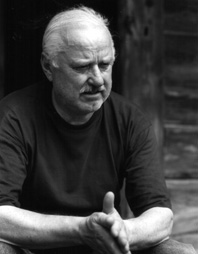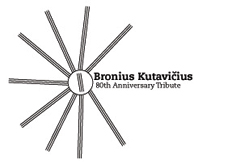MUSIC THAT CHANGED TIME:
The Baltic Outburst of Creativity after 1970
43rd International Baltic Musicological Conference, dedicated to the 80th anniversary of Lithuanian composer Bronius Kutavičius
12–14 September 2012, Vilnius
In the music of the Baltic countries, the period between the end of World War II and the fall of the ‘Iron Curtain’ is inseparable from totalitarian regime and attempts to circumvent its constraints. Compositions of the first post-war decades were infused with the Soviet and pseudo-folkloric aesthetic. It is only in the 1960s that the music of the Baltic countries experienced a sudden leap of modernisation, when the political climate had ‘thawed,’ contacts had been made with the musical communities existing in other Eastern bloc countries, and the whole cultural paradigm had changed. The young composers of the time became besotted with ideas of the avant-garde. Yet it is not until the beginning of the 1970s that the more profound renewal commenced in the music of Lithuania and other countries of the Baltic region, with the increasing importance of the ideas of cultural resistance, national identity and creative freedom.
The 1970s and 1980s were marked with the search for national identity, distinct for each Baltic country. On the one hand, the composers of that generation sought ways to form their own musical language and individual expression; but on the other, there was a growing necessity to develop ideas and values that would consolidate artistic communities in different countries. The official Soviet authorities then proclaimed the doctrine of ‘developed socialism;’ meanwhile, individual voices emerged in the arts who heralded national awakening and thereby gradually undermined the foundations of the system, arousing the sense of longing for sincerity, partnership, national traditions, spirituality, religious and personal freedom. These values were encapsulated in the powerful, sensuous and uncompromising musical works by Estonians Veljo Tormis and Arvo Pärt; Latvians Pēteris Vasks and Pēteris Plakidis; Lithuanians Feliksas Bajoras, Osvaldas Balakauskas and Vytautas Barkauskas.
|

Photo: Arūnas Baltėnas
|
In Lithuania, works by
Bronius Kutavičius (b. 1932) provoked something of a cultural shock in the public of the time. After trying out various avant-garde techniques, in the beginning of the 1970s, Kutavičius turned towards more ascetic, repetitive style (later defined as
Baltic minimalism) and themes related to historical, religious and cultural identity. The first performances of his
Pantheistic oratorio (1970),
Dzukian Variations (1974),
The Small Spectacle (1975),
Last Pagan Rites,
Two Birds in the Shadows of the Woods (both written in 1978),
Anno cum tettigonia (1980) became exceptional events in Lithuanian music of the time.
Similar to an anthropologist, Kutavičius endeavoured to reconstruct the rituals, values, identities and feelings supposedly characteristic of archaic cultures, as well as to reform the very notion of a musical work, as a structured configuration of sounds, by giving a new lease of life to narrativity that has been so adamantly denounced by the avant-garde. Deeply affecting and communicative, the music of Kutavičius did overcome the barrier of mistrust and intolerance, surrounding contemporary music on the side of the public. It not only mustered members of the musical community, attracted poets, writers, artists, theatre people, diverse intellectuals, but also inspired new reflections which lead to the exploration of more suggestive and sensitive forms of rhetoric, on the one hand, and to the analysis of the cultural context of music, on the other.
Suggested themes for scholarly papers:
- 1. National discourse within the work of Kutavičius;
- 2. Kutavičius as a contriver of anthropological phenomena;
- 3. Literary and theatrical gestures within the music by Kutavičius;
- 4. Reception of Kutavičius’s work in Lithuania and other countries;
- 5. Mysteries of communicative powers of Kutavičius’s work;
- 6. Performer in the creative process of Kutavičius’s work;
- 7. Kutavičius and the process of composing;
- 8. Interpretive paradigms of the works by Kutavičius;
- 9. The scope of Kutavičius’s influence: pupils, followers, imitators
- 10. Music as a form of cultural resistance;
- 11. Authenticity cultures and post-modern music;
- 12. Post-modernist technology and psychology of constructing meaning in music.
Please note: the applicants are most welcome to submit papers, analysing similar figures and processes in the music of the Baltic and other countries of the same period.
The conference is organised by the Lithuanian Composers’ Union and the Lithuanian Academy of Music and Theatre, in association with the Latvian Composers’ Union and the Estonian Musicological Society. The conference programme also includes special cultural events, dedicated to the oeuvre of Bronius Kutavičius.
Scholarly Committee of the Conference Programme:
Gražina Daunoravičienė (Lithuanian Academy of Music and Theatre)
Rūta Stanevičiūtė (Lithuanian Academy of Music and Theatre)
Krzysztof Droba (Academy of Music in Kraków)
Urve Lippus (Estonian Academy of Music and Theatre)
Gundega Šmite (Latvian Composers’ Union)
Dario Martinelli (University of Helsinki)
Jūratė Katinaitė (Lithuanian Composers’ Union)
The languages of the conference are English and German. The abstracts of the conference papers should be submitted by 1 June 2012. The abstracts should be written in English or German (up to 500 words for 20 min presentation) and sent by e-mail: info@lks.lt
All applicants will be notified about the selection results of the submitted abstracts by 20 June 2012.
For more information about the conference please contact Jūratė Katinaitė, chair of the Musicological Section of the Lithuanian Composers’ Union by e-mail jkatinaite@gmail.com or telephone +370 687 74158.
There is no participation fee for the conference. Travel costs and accommodation must be covered by the participants. The organizers will provide several hotel options at special rates for participants of the conference.


